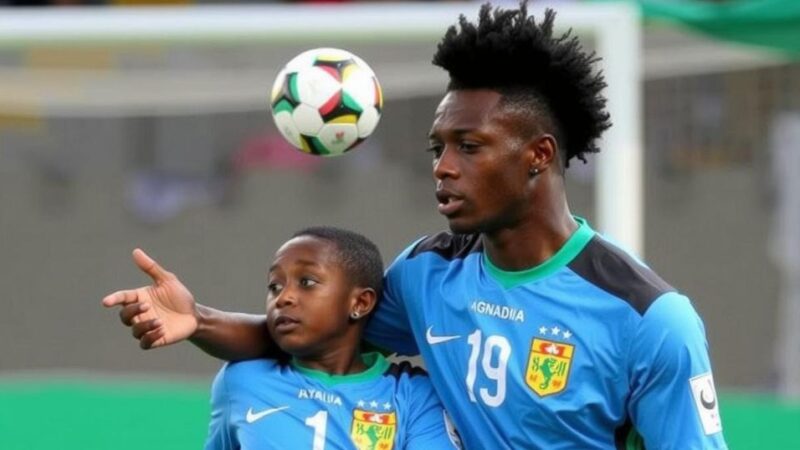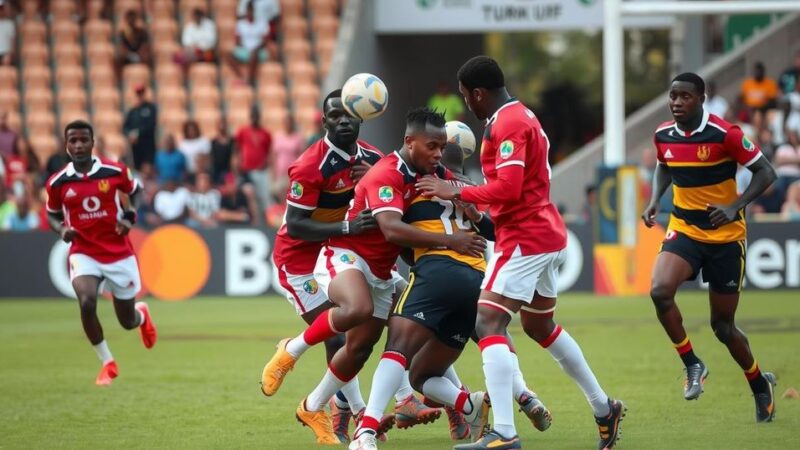The Nigeria national football team is embroiled in a serious controversy following their arrival in Libya for an AFCON qualifier. Stranded at Al-Abraq Airport without food or communication for hours, players, including captain William Troost-Ekong, have claimed they are being held hostage. This conflict arises after Nigeria’s previous match victory, prompting allegations of poor treatment from both sides, and leading to a potential boycott of their scheduled game as the NFF and Libyan authorities dispute the events that transpired during the matches.
Amid controversy surrounding a crucial Africa Cup of Nations (AFCON) qualifier, members of the Nigeria national football team allege they have been effectively stranded and held under poor conditions in Libya. Approximately twelve hours of waiting at Al-Abraq Airport without access to food, drink, or telephone services culminated in Leicester City midfielder Wilfred Ndidi describing the situation as akin to being held “hostage.” The backdrop to this unfortunate incident stems from a previous match where Nigeria achieved a narrow 1-0 victory over Libya, fueling claims from the Libyan team of inadequate treatment in Nigeria. Following this, Nigeria’s chartered flight was diverted to Al-Abraq Airport, a considerable distance from their intended destination, Benghazi. This governmental action has prompted outrage among Nigerian players, with many expressing their dissatisfaction on social media platforms. Team captain William Troost-Ekong reported the situation, stating: “12+ hours in an abandoned airport in Libya after our plane was diverted whilst descending. Libyan government rescinded our approved landing in Benghazi with no reason. They’ve locked the airport gates and left us without phone connection, food or drink. All to play mind games.” Players including Victor Boniface echoed these sentiments, highlighting the dire circumstances faced at the airport. In a call for action, forward Victor Osimhen condemned the lack of support their team encountered, urging for intervention from the Confederation of African Football (CAF) as conditions remained grim. Troost-Ekong later announced in protest, the team’s decision to abstain from participating in the scheduled game due to the treatment they received. Additionally, the conflict of narratives has emerged regarding arrangements made during the previous fixture, with the Nigeria Football Federation (NFF) refuting claims made by Libya concerning their treatment during the hosted match. This ongoing dispute serves to highlight significant organizational failures surrounding the AFCON qualifiers, as both teams await resolution to this troubling incident.
The ongoing issues between the Nigeria national football team and Libya stem from a series of encounters related to the Africa Cup of Nations (AFCON) qualifiers. Disputes surrounding treatment, transportation, and match conduct have surfaced, culminating in allegations of mistreatment by both sides. The Nigerian team, following a victory over Libya, faced logistical challenges that led to their diversion and subsequent stranding, sparking widespread outrage and calls for accountability within the football governing bodies.
In conclusion, the situation currently facing the Nigerian squad in Libya has escalated into a serious matter of player welfare and national representation. The allegations of being held hostage, severe mistreatment, and inadequate conditions challenge the integrity of the AFCON qualifiers. It remains uncertain whether the upcoming fixture can proceed as Nigeria’s players rally against their treatment, seeking justice and respect in international football. Stronger measures from the CAF may be required to address these pressing concerns and ensure the safety and dignity of the athletes involved.
Original Source: www.dailymail.co.uk






